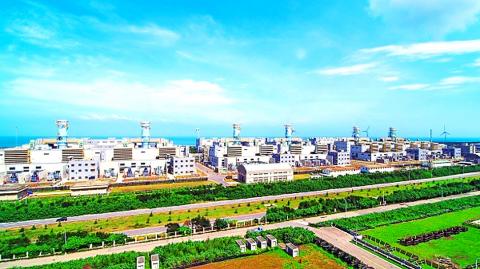Human error and systematic flaws triggered the power outages nationwide on Aug. 15, according to a government analysis published yesterday.
The Executive Yuan released the analysis after wrapping up its investigation into the incident.
The blackouts occurred after the natural gas supply to a major power plant in Taoyuan’s Datan Township (大潭) was abruptly cut off, causing all six generators at the plant to shut down, the analysis said.

Photo: courtesy of Taiwan Power Co
The ensuing power outages affected 5.92 million households, while 423 manufacturers reported losses and about 900 elevator shutdowns were reported.
Technicians employed by a contractor for state-run oil refiner CPC Corp, Taiwan (台灣中油), which manages a natural gas metering system connected to the power plant, committed several mistakes during routine maintenance.
The technicians did not switch the control of the metering system to manual and they cut off the power to the control system for 21 seconds, causing it to automatically shut down the gas supply valve, the investigation found.
CPC Corp should be held accountable for the errors, as there was only one CPC official supervising the replacement procedure conducted by the employees of the contractor, but the official left no record, it said.
CPC Corp also did not draw up a standard replacement procedure and failed to assess the risks involved in the contractor’s replacement procedure.
It also failed to timely inform Taiwan Power Co (Taipower, 台電), which runs the Datan plant.
The design of the metering system is also flawed, as it puts too many important functions on one single control system, which, when not working properly, automatically shuts off the supply valve, the investigation found.
The gas supply is also run by a single pipeline with no backup system, the report said.
Taipower, although it handled the emergency generator shutdown and contingency power rationing efforts well, does not have a warning system in place to notify users of its rationing measures, causing inconvenience to the public, the investigation found.
Taipower then compounded the problem by shifting control of a generator at the Taichung Power Plant from manual to automatic without first confirming that the system was completely restored, causing the generator to trip.
To make improvements, both CPC Corp and Taipower should launch a comprehensive examination of their systems and management, to try to remove the possibility of human error and mismanagement, the report said.
The two companies should also establish an effective cooperation mechanism and multiple backup power generation systems, while improving their professional management and training, the report said.
The Ministry of Economic Affairs would take disciplinary measures against all those involved, including CPC Corp and Taipower technicians and supervisors, the report said.
CPC Corp and Taipower staff deemed responsible for the incident are to be punished for negligence, and former officials whose duties involved the operations of the gas supply system in question would also undergo scrutiny, the ministry said.

SECURITY: As China is ‘reshaping’ Hong Kong’s population, Taiwan must raise the eligibility threshold for applications from Hong Kongers, Chiu Chui-cheng said When Hong Kong and Macau citizens apply for residency in Taiwan, it would be under a new category that includes a “national security observation period,” Mainland Affairs Council (MAC) Minister Chiu Chui-cheng (邱垂正) said yesterday. President William Lai (賴清德) on March 13 announced 17 strategies to counter China’s aggression toward Taiwan, including incorporating national security considerations into the review process for residency applications from Hong Kong and Macau citizens. The situation in Hong Kong is constantly changing, Chiu said to media yesterday on the sidelines of the Taipei Technology Run hosted by the Taipei Neihu Technology Park Development Association. With

CARROT AND STICK: While unrelenting in its military threats, China attracted nearly 40,000 Taiwanese to over 400 business events last year Nearly 40,000 Taiwanese last year joined industry events in China, such as conferences and trade fairs, supported by the Chinese government, a study showed yesterday, as Beijing ramps up a charm offensive toward Taipei alongside military pressure. China has long taken a carrot-and-stick approach to Taiwan, threatening it with the prospect of military action while reaching out to those it believes are amenable to Beijing’s point of view. Taiwanese security officials are wary of what they see as Beijing’s influence campaigns to sway public opinion after Taipei and Beijing gradually resumed travel links halted by the COVID-19 pandemic, but the scale of

A US Marine Corps regiment equipped with Naval Strike Missiles (NSM) is set to participate in the upcoming Balikatan 25 exercise in the Luzon Strait, marking the system’s first-ever deployment in the Philippines. US and Philippine officials have separately confirmed that the Navy Marine Expeditionary Ship Interdiction System (NMESIS) — the mobile launch platform for the Naval Strike Missile — would take part in the joint exercise. The missiles are being deployed to “a strategic first island chain chokepoint” in the waters between Taiwan proper and the Philippines, US-based Naval News reported. “The Luzon Strait and Bashi Channel represent a critical access

Pope Francis is be laid to rest on Saturday after lying in state for three days in St Peter’s Basilica, where the faithful are expected to flock to pay their respects to history’s first Latin American pontiff. The cardinals met yesterday in the Vatican’s synod hall to chart the next steps before a conclave begins to choose Francis’ successor, as condolences poured in from around the world. According to current norms, the conclave must begin between May 5 and 10. The cardinals set the funeral for Saturday at 10am in St Peter’s Square, to be celebrated by the dean of the College